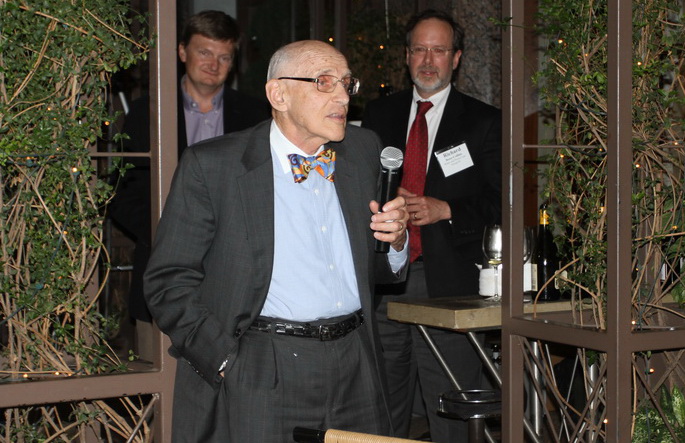In Memoriam: Joseph L. Sax, Gentleman, Scholar, Giant of Environmental Law
Visionary environmental advocate will be sorely missed, long remembered.

[Posted on behalf of all Legal Planet authors at Berkeley Law.] It is with great sadness that we share the news of the passing of Joseph L. Sax, James H. House and Hiram H. Hurd Professor of Environmental Regulation (Emeritus) at Berkeley Law. Joe was our hero, our teacher, our mentor, our colleague, our friend. We will miss his intellectual vigor and creativity, and the gentle way he approached even the most potentially divisive issues. We will do our best to carry on his work with the same commitment, integrity, and humility he brought to it.
Joe graduated from Harvard College and the University of Chicago Law School. He began his law teaching career at the University of Colorado in 1962, moved to the University of Michigan in 1966, and came to Berkeley in 1986. It would be impossible to overstate Joe’s influence on environmental and natural resources law over the last half century. In the 1960s, he and a handful of others literally invented the field. Joe wrote a series of seminal articles and books, breaking new and important intellectual ground on topics as diverse as regulatory takings, the public trust doctrine, management of the national parks and other public lands, citizen enforcement of environmental law, western water law, and cultural property protection.
Joe’s scholarship was never timid. He cared deeply about the issues he took on. He believed that the public had important interests in shared resources and even in some resources conventionally viewed as entirely private. He saw the courts as the institution often best situated to protect that public interest. He sought to persuade judges to take on that responsibility and to convince the political branches to assign the courts that role. He did not shirk from taking controversial positions on difficult issues. But Joe’s scholarship was also never overbearing or overwrought. He was a scholar’s scholar: he read voraciously and broadly, he thought synthetically, he reasoned carefully, and he always treated opposing arguments with respect. Among his many classic works are: Takings and the Police Power, 74 Yale Law Journal 36 (1964); The Public Trust in Natural Resource Law: Effective Judicial Intervention, 68 Michigan Law Review 771 (1970); Takings, Private Property and Public Rights, 81 Yale Law Journal 149 (1971); Defending the Environment (1971): Mountains Without Handrails (1980); Glacier National Park and Its Neighbors: A Study of Federal Interagency Relations, 14 Ecology Law Quarterly 207 (1987) (with Robert Keiter); Property Rights and the Economy of Nature: Understanding Lucas v. South Carolina Coastal Council, 45 Stanford Law Review 1433 (1993); and Playing Darts with a Rembrandt (2001). Recently he had been writing about the little-known property doctrines of accretion and avulsion, which have gained new importance with climate change; about application of takings doctrine to water rights; and about the concept of a “fair share” of resources in property law.
As a teacher, Joe influenced countless students. Some went on to work in academia, others to government, and many to private law firms. Anyone who had the good fortune to experience one of his classes (as I did, many years ago), came away not only with a much deeper understanding of the subject matter but with a sense of the importance of approaching tough issues honestly and directly, and a great model for doing so. As Chris Carr, a 1994 Boalt grad now at Morrison and Foerster in San Francisco, wrote recently in support of Joe’s nomination for a Lifetime Achievement award from the California state bar, Joe’s teaching “conveyed the unmistakable message that the issues needed to be engaged deeply, with rigor, and with an appreciation for the perspectives of others.” One of his greatest teaching contributions was the development of a water law casebook that, true to Joe’s form, went well beyond judicial opinions to include a variety of materials that helped put the issues in context. It’s routine now for environmental and natural resources casebooks to range well beyond the law, thanks in large part to Joe’s vision.
Joe was never content to confine his work to the ivory tower. Throughout his career he engaged directly and effectively with the issues he cared about in judicial, legislative, and executive fora. He authored amicus briefs, consulted on litigation, served as an expert witness and as a consultant. He worked with countless environmental public interest groups and state and federal agencies. He drafted legislation that became Michigan’s Environmental Protection Act, one of the first environmental public participation laws in the nation. He was a special advisor to Interior Secretary Bruce Babbitt in the mid-90s, when the Endangered Species Act first came under heavy fire from the right, and helped Babbitt and then-Interior Solicitor John Leshy find needed flexibility in that landmark law. In 2002, he authored a report for the State Water Resources Control Board on groundwater management that unfortunately has not yet catalyzed legislative change.
We could go on and on. In short, Joe was the consummate academic, a visionary and influential environmental advocate, and so much more. He will be sorely missed and dearly remembered. His influence will continue for many decades to come, through his writings and through the work of those he taught. At Berkeley Law, we will strive to live up to his legacy.
Reader Comments
One Reply to “In Memoriam: Joseph L. Sax, Gentleman, Scholar, Giant of Environmental Law”
Comments are closed.





Thank you, Holly. More on Prof. Sax at environmentlawhistory.blogspot.com.